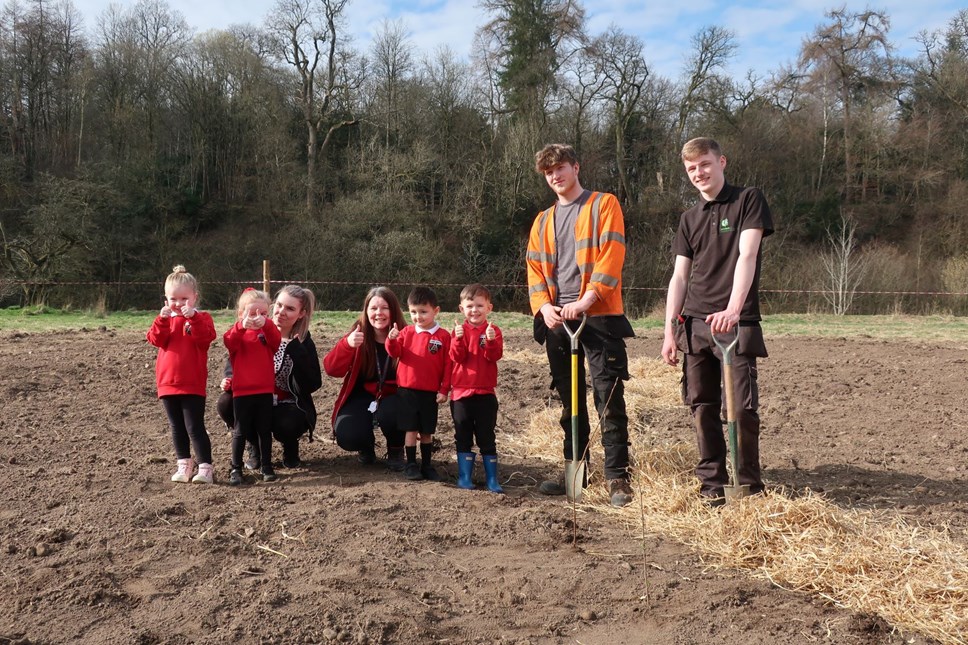
Big impact for East Ayrshire’s Wee Forests
Children and young people joined with community volunteers in Cumnock and Kilmarnock to embrace an opportunity to connect with nature by planting and caring for their own ‘Wee Forest’.
Around 600 native trees were planted by “Wee Foresters” in an area the size of a tennis court in each town. Capable of attracting 500 animal and plant species within the first three years, the forests will be looked after by a volunteer Tree Keeper Team including children and young people from James Hamilton Primary, St Andrews Primary and Park School in Kilmarnock and The Robert Burns Academy in Cumnock, who will also use them for outdoor learning. Children from Cherrytrees Early Childhood Centre planted the first trees at the Barony Campus.
East Ayrshire Woodlands worked in partnership with East Ayrshire Leisure and East Ayrshire Council to develop Wee Forest sites at Kennedy Drive on the edge of Dean Castle Country Park, and next to the Lugar Water path on the Barony Campus. As the woodland establishes it will enhance the amenity of these popular walking areas and their value as places for nature and wellbeing.
David McDowall, Head of Economic Growth said: “Wee Forests are part of the global family of ‘Miyawaki Forests’ or ‘Tiny Forests’, which meet a consistent global standard. This means their benefits can be easily measured by the local community and shared. Through our climate change strategy East Ayrshire Council is working to ensure that our children and young people have a future. It is really important that we involve them in important community projects like the Wee Forest at both Kennedy Drive and at the Barony Campus, as this will help to ensure positive environmental change.”
Anneke Freel, East Ayrshire Leisure’s Chief Officer said “We were delighted to be involved in this partnership project. The planting will not only be a valuable outdoor learning resource for young people, it also creates new habitat for wildlife and enhances the beauty of these areas for communities.”
Bruce Davidson from East Ayrshire Woodlands said: “The Wee Forest project will provide an opportunity for our tree and timber apprentices to learn new practical skills that will help with Scotland’s green recovery. East Ayrshire Woodlands, in partnership with East Ayrshire Council and East Ayrshire Leisure, recognises the importance of the forestry and land management sector and has created an excellent vocational programme for our young people.”
The Barony Campus and Kennedy Drive Wee Forests are part of a £500K Scottish Government funded project, led by NatureScot, which will see schools and local communities planting 20 Wee Forests across the country just as Spring arrives.
Supported by Earthwatch Europe, schools and local people will take part in citizen science activities to raise awareness of climate change and the value of urban trees. This will include monitoring the butterflies that use the forests, calculating the amount of carbon captured and measuring the impact that trees have on slowing down the run-off from rainstorms.
Karen Morrison, NatureScot Wee Forests Project Officer, said: “Wee Forests are not only a great way to help people connect with nature closer to home, they also can inspire the next generation to care for it. We’re delighted to see school children and the local community coming together to plant the Barony Campus and Kennedy Drive Wee Forests and we hope that over the years it will be the source of much enjoyment, learning and inspiration. As well as the many benefits for people, projects like this are also giving communities an important opportunity to help restore nature and tackle climate change by contributing to Scotland’s tree planting targets.”
Steve Andrews, CEO, Earthwatch Europe said: “Getting communities involved in citizen science where they live is a vital step in understanding and solving our planet’s environmental crises – with Wee Forests, communities can collect the data we need on their doorstep.”
Notes to editors
Background
Wee Forests are small, densely planted, fast growing, species-rich areas of new woodland that provide a space for outdoor learning and for communities to connect with nature.
The approach is based on an established forest management method developed in the 1970s by Dr Akira Miyawaki.
Wee Forests are part of the Tiny Forests programme, co-ordinated by Earthwatch. For further information on Tiny Forests: https://earthwatch.org.uk/get-involved/tiny-forest
NatureScot is Scotland’s nature agency. We work to enhance our natural environment in Scotland and inspire everyone to care more about it. Our Priority is a nature-rich future for Scotland and an effective response to the climate emergency. For more information, visit our website at www.nature.scot or follow us on Twitter at https://twitter.com/nature_scot.
Earthwatch is an international environmental non-profit organisation connecting people with scientists worldwide to conduct environmental research and empowering them with the knowledge they need to conserve the planet.
Scottish environmental organisations partnering on Wee Forests are: Dundee University Botanic Gardens, Edinburgh and Lothians Greenspace Trust, Aberdeen Council, The Conservation Volunteers, East Ayrshire Woodlands; and Green Action Trust.
